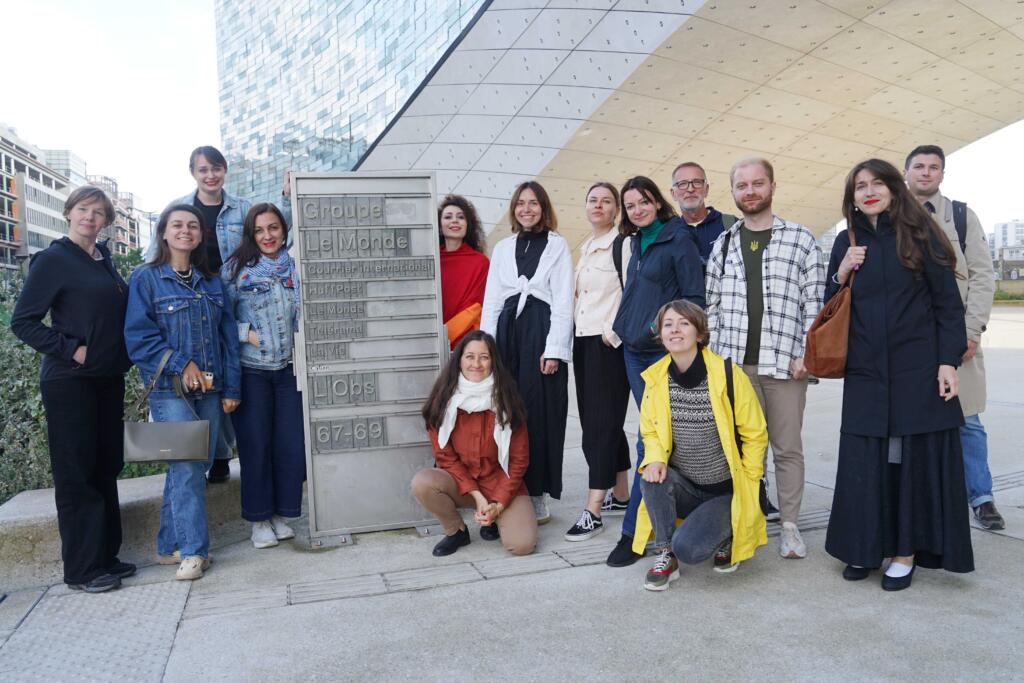

Berlin, Germany:
In late May, twelve Ukrainian journalists visited Berlin as part of the Europe Ukraine Desk project. They met with local experts, including Prof. Dr. Jan Claas Behrends, who discussed German perspectives on war and peace, and Wilfried Jilge, who analyzed German-Ukrainian relations. The group visited media outlets such as Deutschlandfunk, ZEIT ONLINE, and Frankfurter Allgemeine Zeitung, engaging in dialogues about the coverage of Russia’s war against Ukraine and Russia’s influence on both nations.
A talk with war correspondent Katrin Eigendorf (ZDF), moderated by journalist Anastasia Magazova, highlighted the challenges of war reporting. The visit ended with a presentation by Ukrainian journalists at the n-ost media hub, where Katya Moskalyuk presented her project "Alone," dedicated to the wives of fallen soldiers, and Yaroslava Tymoschuk presented her documentary addressing the issue of identifying killed soldiers.
The longer the war lasts, the harder it is to keep foreign media attention. Yet, after visiting German newsrooms, I believe Ukraine remains a focus. Now is the time to discuss not only the war but also broader contexts, like Ukrainian culture and stolen cultural heritage.
Yaroslava Tymoschuk
Paris, France:
Paris became the second stop for twelve Ukrainian journalists on their journey across EU newsrooms. The visit began with Valentyna Dymytrova, an associate professor in information and communication sciences at Lyon 3 University, mapping out the French media landscape and explaining their ideological nuances and the preferences of French audiences. The professional exchange included visits to the newsrooms of Le Monde, Le Figaro, and France Medias Monde, where French journalists shared their approaches to covering foreign affairs, combating Russia’s disinformation, and providing in-depth reporting on Ukraine.
The final evening in Paris featured a public discussion titled “Women in Ukraine During the War,” hosted at Espace des Femmes. During the event, Ukrainian journalists, with moderation by French journalist Audrey Lebel, discussed the varied experiences of women during the war.Berdynskykh spoke about female fighters and reminded the audience of paramedic Iryna Tsubukh, whose death on the frontline the day before the event devastated many Ukrainians. She also talked about women taking on jobs traditionally held by men, such as coal mining. Katya Moskalyul talked about the wives of fallen soldiers, while Oleksandra Horchynska shared stories of sexual violence committed by Russian soldiers against Ukrainian women and men.
It is gratifying to see that the French media continue to actively follow what is happening in Ukraine and write about the Russian invasion and occupation of part of our country's territory.
Mykhailo Shtekel
Madrid, Spain:
Sunny Madrid was the final destination. The visit began with a meeting with Spanish journalist David Jiménez, who shared his experiences as a war correspondent and editor-in-chief of El Mundo. Nicolás De Pedro from The Institute for Statecraft also provided insights on Russian disinformation in Spain and Latin America. The Ukrainian journalists visited newsrooms such as El País, El Español, and El Confidencial.
I was impressed by the technological level of the Spanish media and their willingness to inform the Spanish audience about Ukraine and Ukrainians during wartime.
Natali Sokolenko